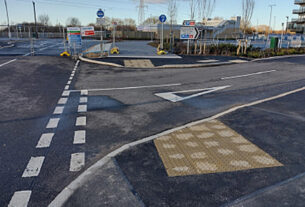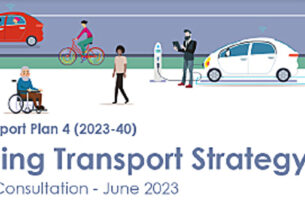
Matt Rodda MP took time out of his busy schedule on Friday 2nd November to meet Adrian Lawson, John Lee and Brian Morley to discuss what he could do for the Reading Cycle Campaign.
He introduced himself as being a Reading Councillor in 2011 before he became MP for Reading East. He walks across Christchurch Bridge to catch his train to London, and sometimes he takes his fold-up bike with him.
He is currently Shadow Minister for Local Transport, this includes buses, taxis, walking and cycling. Currently he is focusing on a new scheme to get bus passes for young people as well as pensioners.
The Labour Party has a policy that looks at improving cycling infrastructure in big cities like London and Manchester, to make people feel safer to cycle.
He acknowledged that cyclists ride on the pavement because they are scared of riding on the road. However, for most civil engineers looking at road infrastructure, cycling is merely an ‘add on’, and Councils tend to forget about this altogether.
New road building only focuses on the car, including new housing estates. He acknowledged there was a prejudice against cycling.
John Lee asked about linking cycling with health and wondered if the cycle network could be funded from the health budget.
Matt Rodda said he understood the connection between cycling and health. Everybody should walk at least 2 miles a day, and how the lack of proper exercise results in increasing obesity which can affect general wellbeing.
Adrian Lawson asked what Matt thought about improving air quality and the effects on climate change.
Matt acknowledged the need to move away from diesel engines to using electric hybrids. Short delivery journeys or the last few miles of transportation should look at using cargo bikes instead of large lorries.
John Lee asked about subsidies such as a scrappage scheme that only go to the motorists and on motorway upgrades, when it could be spent on e-bikes in towns.
Matt Rodda spoke about keeping up the pressure to change behaviour and how this affects the environment, such as parking levies, congestion charges, restricting use to only electric cars in town centres, and city-friendly public transport.
John Lee reminded Matt about increasing house building without infrastructure in place, which includes unsuitable links for buses and cycling facilities to get people into the town centres. There is plenty of encouragement for electric cars rather than for cycling facilities.
Brian Morley said it was a myth that cyclists do not buy much in town centres. This may be why cyclists are discouraged. Provision of more cycle racks in Broad Street would bring more shoppers to the area.
Matt Rodda asked for more information about this. He acknowledged the lack of vision in local government, and that both politicians and officers have utter contempt for cyclists.
Local authorities don’t know how to use their funding correctly or appropriately. They are hindered by local level bureaucracy and don’t listen to advice, especially from lobby groups.
Adrian Lawson said a Cycling Czar is needed for each area to review each transport design guide. Hopefully this will go towards prevention of shared pavement use.
John Lee mentioned inappropriate schemes like the controversial MRT route, which is only applicable for 1% of pedestrians and cyclists.
Matt Rodda confirmed he was aware of cycle paths should follow the best procedure as regarding dooring. Adrian Lawson said he has met with Simon Beasley regarding dooring.
John Lee said a Cycle Forum meeting had discussed improving conditions in university parking, including looking at speed and parking controls.
Simon Beasley was quite helpful and said he would speak to Tony Page, who tends to be more focused on finding money for the buses, preferring to promote more bus use rather than encouraging people to cycle.
Adrian Lawson explained the Close Pass Initiative to Matt Rodda, when plain clothed policeman on bikes who have experienced close passing relay details of the miscreants to their colleagues ahead, who stop them to ‘have a chat’. This inexpensive deterrent worked on word of mouth to publicise it to other car users.
John Lee said more enforcement could be done with speed cameras which actually have film in them. Lorries need to be designed like the ‘London Lorry’ with lower windows so that cyclists, pedestrians and cars can be seen.
Currently lorry drivers cannot see the ground for the 4m in front of them. Also HGV mirrors consist of four sets on each side which are stacked in a non-cognitive way with the top one being for the lowest vision.
Matt acknowledged he needed to find out more about this. He said there was a need to find out what could be done quickly; however looking at speed limits could be more difficult.
The Close Pass Initiative idea is more plausible, and momentum could be built by demonstration to make this more acceptable. Consultation is needed for radical change, and the community need to show they want it.
Brian Morley stressed reinforcement is key. Police have said that they have issued 30 tickets for speeding of over 30mph in a 20mph zone in the area of Christchurch Road and adjoining streets. These seem to have been the only action since the much abused 20mph East Reading area started two years ago.
Matt Rodda said cameras need to issue automatic tickets via radar technology. However, there is a lack of awareness by those who drive big cars and live in villages, who only drive to activities and talk to people who live in similar situations.
Adrian Lawson said this only results in building more roads.
John Lee asked about park and ride facilities. They should be placed further out from towns and cities, with the country buses suitably subsidised to help with transport and to prevent them from being shut down.
More cycle racks should be included to encourage more cycling. John then moved onto road markings and mentioned the 19 incidents on the Vastern Road Roundabout, which has the worst road markings combined with speeding traffic that doesn’t give way.
He showed Matt Rodda information on Dutch style markings, such as elephant footprints and shark’s teeth at crossings that aren’t always available in the UK.
Matt Rodda said there was a need to enforce speed and signage changes. Cycling should be encouraged to make it more normal, including walking into town centres and to the station, enhanced with a café environment to make it more attractive and enjoyable.
John Lee reminded Matt that pedestrians don’t have priority at side road junctions in the UK. There is also difficulty to enforce giving way when turning left. He suggested tightening up the road radius as a national guidance for road design. Studies done in London reveal a 30% reduction in collisions at junctions.
Adrian Lawson explained cyclists have to give way far less on the road then on a shared pavement for the same stretch of road on the NCN422.
Matt Rodda approved the Dutch style markings for junctions, but he said drivers will need to be educated to enforce this. Cameras on red lights catch those who jump lights, for example, but he was more worried about dangerous drivers and how to tackle them. There is a need to find a way to simply change driver behaviour.
Adrian Lawson said Close Pass is very effective with less people and fewer resources.
John Lee suggested enforcement could include forcing drivers to retake their test, including a quiz for the highway code. Most people don’t know what’s in the highway code.
Matt Rodda said he was sympathetic to disabled users; those with wheelchairs, pushchairs and the partially sighted. More empathy for equality is needed, linked to local transport and combined with walking and cycling.
Adrian Lawson reminded Matt about the barriers on the river paths that only benefit able-bodied people.
Matt Rodda confirmed realistic targets were needed for areas that could be quickly and dramatically changed, such as subsidising bus services for young people. Also there is a need to find a way to deal with emotion against cycling and stimulate a change in thinking.
Alice Elliott



In his response to the framework consultation on new flats for the old Royal Mail site, Matt Rodda, MP for East Reading said: “Car parking should be treated as a higher priority, particularly for residents who own a car and need to park it for long periods in order to commute to London or use public transport.”
Mr Rodda is another mealy-mouthed politician with no idea about anything to do with cycling. Politicians like this have been stringing cycling activists along for decades and think they can continue in the same vein indefinitely.